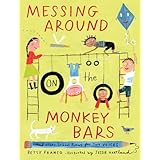Franco, Betsy. 2009. Messing Around on the Monkey Bars. Massachusetts: Candlewick Press. ISBN: 978-0-7636-3174-1.
What a fun book! This collection of nineteen poems tells about a kid’s day at school. Ranging from the classroom to the bus ride, the poems highlight the daily activities of school in an energetic way. Students will enjoy reading this whole book of performance poetry. Broken up into “voices”, students are assigned a part to read and some lines require both to read aloud. Each part is a different font (normal, bold, bolder) to make each reader’s lines clear. While the poems could be read solo, the words are clearly meant to be squealed and shouted by students performing for their peers or parents. The words are simple enough for elementary students to read with ease yet share the feeling of a kid who forgot the report was due (“Animal Reports”) and another who is racing to the front of the line after recess (“Me and Joe Lining up after Recess”). The idea of having students read together builds a cadence to reading as the struggling readers can be imitate the more fluent reader. The rhyming words are not sing-songy, but they help the nervous reader quickly find the beat of the poem. The bright pictures only add to the feeling of excitement about school.
The whole book should be shared with students. The brevity of the poem allows for many different groups to participate in the performance, and more than one poem could be performed in a day without taking too much time. “Anatomy Class” is a must-share for an ESL or bilingual class. English is a HARD language to learn, especially with its idioms, homophones, and colloquialisms. This poem is a great springboard for a lesson about figurative and literal language.
“Anatomy Class”
The chair has
arms.
The clock,
a face.
The kites have
long and twirly tails.
The tacks have
heads.
The books have
spines.
The toolbox has
a set of nails.
Our shoes have
tongues,
the marbles,
eyes.
The wooden desk has
legs and seat.
The cups have
lips.
My watch has
hands.
The classroom rulers all have
feet.
Heads, arms, hands, nails, spines, legs, feet, tails, face, lips, tongues, eyes.
What a surprise!
Is our classroom alive?
Although I do not have this book in my library currently, I have written the title down to be ordered next year. It's a must-have!
What a fun book! This collection of nineteen poems tells about a kid’s day at school. Ranging from the classroom to the bus ride, the poems highlight the daily activities of school in an energetic way. Students will enjoy reading this whole book of performance poetry. Broken up into “voices”, students are assigned a part to read and some lines require both to read aloud. Each part is a different font (normal, bold, bolder) to make each reader’s lines clear. While the poems could be read solo, the words are clearly meant to be squealed and shouted by students performing for their peers or parents. The words are simple enough for elementary students to read with ease yet share the feeling of a kid who forgot the report was due (“Animal Reports”) and another who is racing to the front of the line after recess (“Me and Joe Lining up after Recess”). The idea of having students read together builds a cadence to reading as the struggling readers can be imitate the more fluent reader. The rhyming words are not sing-songy, but they help the nervous reader quickly find the beat of the poem. The bright pictures only add to the feeling of excitement about school.
The whole book should be shared with students. The brevity of the poem allows for many different groups to participate in the performance, and more than one poem could be performed in a day without taking too much time. “Anatomy Class” is a must-share for an ESL or bilingual class. English is a HARD language to learn, especially with its idioms, homophones, and colloquialisms. This poem is a great springboard for a lesson about figurative and literal language.
“Anatomy Class”
The chair has
arms.
The clock,
a face.
The kites have
long and twirly tails.
The tacks have
heads.
The books have
spines.
The toolbox has
a set of nails.
Our shoes have
tongues,
the marbles,
eyes.
The wooden desk has
legs and seat.
The cups have
lips.
My watch has
hands.
The classroom rulers all have
feet.
Heads, arms, hands, nails, spines, legs, feet, tails, face, lips, tongues, eyes.
What a surprise!
Is our classroom alive?
Although I do not have this book in my library currently, I have written the title down to be ordered next year. It's a must-have!


No comments:
Post a Comment